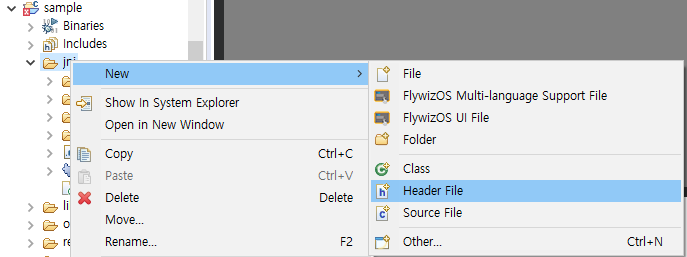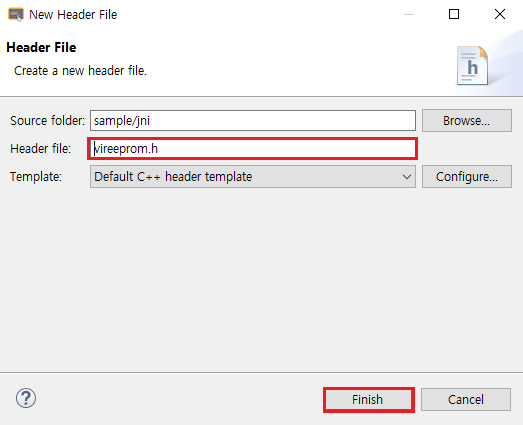EEPROM 기능 에뮬레이션
EEPROM (전원이 공급되는 동안 읽기-쓰기 가능한 메모리)은 사용자가 변경할 수 있는 메모리(ROM)로, 정상보다 높은 전압으로 삭제 및 재 프로그래밍 (다시 쓰기)을 할 수 있습니다.
에뮬레이션 원리
이 시스템은 자체 파일 시스템이 있는 Linux 기반으로 저장된 데이터를 NorFlash에 기록합니다 (삭제 횟수가 100,000 회 이상, Nandfalsh가 아닙니다. NandFlash는 불량 블록이 나타난 후 다양한 위험이 발생할 수 있습니다). /data 파티션은 사용자 데이터를 위해 FlywizOS 내부에 예약되어 있습니다. 마이크로 컨트롤러 작동에 익숙한 사용자의 편의를 위해 /data 파티션 아래에 파일을 생성하여 EEPROM 공간을 시뮬레이션합니다.(/data 파티션의 크기는 특정 시스템 버전에 따라 1M 또는 수백 KB 범위)
사용 시나리오
전원이 꺼진 상태에서 데이터를 유지하십시오.
구현 단계
먼저 프로젝트의 jni 디렉토리에 헤더 파일을 만듭니다.
프로젝트에서 jni를 선택하고 마우스 오른쪽 버튼을 클릭 한 다음 팝업 컨텍스트 메뉴에서 New -> Header File 옵션을 선택한 다음 이름을 vireeprom.h로 지정하고 Finish를 클릭합니다.

방금 추가 한 헤더 파일에 다음 코드를 복사합니다. (헤더 파일 생성 시 일부 내용이 자동으로 추가 및 삭제 될 수 있습니다.) 이 코드는 EEPROM의 에뮬레이션 기능을 구현합니다.
#ifndef JNI_VIREEPROM_H_ #define JNI_VIREEPROM_H_ #include <stdio.h> #include <string.h> #include <unistd.h> /** * The storage size of the emulated EEPROM, in bytes, it is recommended not to be too large */ #define EEPROM_SIZE 1024 /** * Actually saved as a file /data/eeprom.eep */ #define EEPROM_FILE "/data/eeprom.eep" class VirEEPROM { public: VirEEPROM() { memset(buff_, 0, sizeof(buff_)); file_ = fopen(EEPROM_FILE, "rb+"); if (file_) { fread(buff_, 1, EEPROM_SIZE, file_); fseek(file_, 0, SEEK_END); int f_size = ftell(file_); //Adjust the file to a suitable size if (f_size != sizeof(buff_)) { ftruncate(fileno(file_), sizeof(buff_)); fseek(file_, 0, SEEK_SET); fwrite(buff_, 1, sizeof(buff_), file_); fflush(file_); sync(); } } else { file_ = fopen(EEPROM_FILE, "wb+"); //Adjust the file to a suitable size ftruncate(fileno(file_), sizeof(buff_)); } } virtual ~VirEEPROM() { if (file_) { fflush(file_); fclose(file_); sync(); } } /** * Return : less than 0 is failure, greater than 0 is the actual number of bytes written * Parameter: The data pointer that value needs to save, which can be a structure pointer, char*, int*..., size is the * size of the data to be saved * Examples of use: * const char buff[]="12345678"; * VIREEPROM->WriteEEPROM(0,buff,sizeof(buff); */ int Write(int addr, const void* value, int size) { if (file_ == NULL) { return -1; } if ((addr >= EEPROM_SIZE) || ((addr + size) > EEPROM_SIZE)) { //Oversize return -2; } memcpy(buff_ + addr, value, size); if (0 != fseek(file_, addr, SEEK_SET)) { return -3; } int n = fwrite((char*)value, 1, size, file_); fflush(file_); sync(); return n; } /** * Return : less than 0 is a failure, greater than 0 is the number of bytes actually read * Parameter: the data pointer to be read by value, which can be a structure pointer, char*, int*..., size is the size of * the data to be read * Examples of use: * char buff[9]; * VIREEPROM->ReadEEPROM(0,buff,sizeof(buff); */ int Read(int addr,void* value,int size) { if (file_ == NULL) { return -1; } if ((addr >= EEPROM_SIZE) || ((addr + size) > EEPROM_SIZE)) { //Oversize return -2; } memcpy(value, buff_ + addr, size); return size; } /** * Return: * 0 Success * Less than 0 failed */ int Erase() { if (file_ == NULL) { return -1; } if (0 != fseek(file_, 0, SEEK_SET)) { return -2; } memset(buff_, 0, sizeof(buff_)); if (sizeof(buff_) != fwrite(buff_, 1, sizeof(buff_), file_)) { return -3; } fflush(file_); sync(); return 0; } static VirEEPROM* getInstance() { static VirEEPROM singleton; return &singleton; } private: unsigned char buff_[EEPROM_SIZE]; FILE* file_; }; #define VIREEPROM VirEEPROM::getInstance() #endif /* JNI_VIREEPROM_H_ */지금까지 준비 작업이 완료되었으므로 정상인지 테스트하기 위해 몇 가지 예제를 작성하겠습니다.
mainLogic.cc소스 파일을 열고 파일 맨 위에있는 "vireeprom.h" 헤더 파일을 인용하십시오.#include "vireeprom.h"Test code
static void onUI_init(){ //The value array, starting from address 0, is written sequentially char value[4] = {1, 2, 3, 4}; VIREEPROM->Write(0, value, sizeof(value)); //Start reading from address 0, read 4 bytes in sequence, and save the read content in buf char buf[4] = {0}; VIREEPROM->Read(0, buf, sizeof(buf)); //Output log LOGD("Data read : %02x, %02x, %02x, %02x", buf[0], buf[1], buf[2], buf[3]); //Clear all eeprom to 0 VIREEPROM->Erase(); }